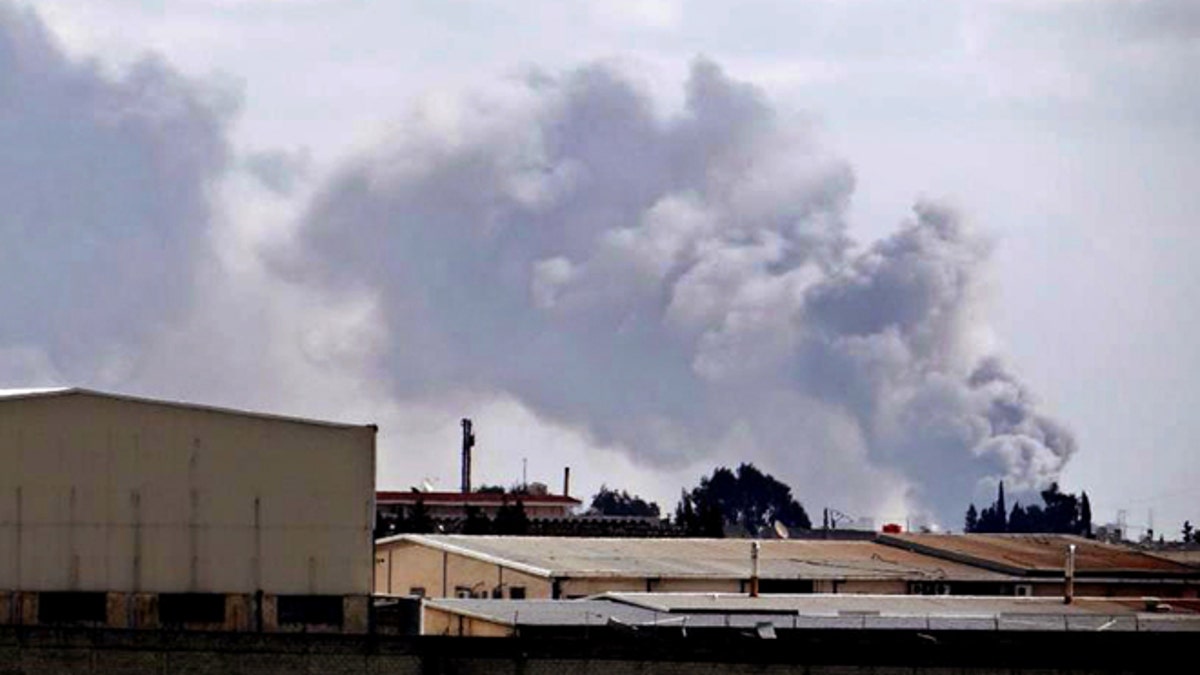
Feb. 12, 2013: Citizen journalism image provided by Aleppo Media Center AMC which has been authenticated based on its contents and other AP reporting, shows smoke rises from Aleppo International Airport, Syria. (AP/Aleppo Media Center AMC)
BEIRUT – Syrian rebels fought pitched battles Wednesday against regime forces at a military base that protects a major airport in the country's north in fighting that has left more than 40 government troops dead, opposition activists said.
Rebels have been attacking the civilian airport in the city of Aleppo for weeks, and now appear to have overrun the main defenses around the facility. But the airport itself, which stopped handling any flights weeks ago because of the fighting, still remains in regime hands.
Also Wednesday, Syria's former Foreign Ministry spokesman made his first comments since disappearing in December, saying he left the country because "of the polarization and violence that left no place for moderation and diplomacy."
Jihad Makdissi, who was known for defending President Bashar Assad's regime in fluent English, said in a statement sent to the Abu-Dhabi-based Sky News Arabia that he did not go to Europe or the U.S. after leaving Syria. He did not say where he currently is, adding that "I have no secrets that anyone would want."
In his statement Wednesday, Makdissi said the Syrian uprising has "legitimate demands."
On Dec. 3, Lebanese security officials said Makdissi flew from Beirut to London. But it was not immediately clear whether he had defected.
After Sky News Arabia posted the letter on Wednesday, Makdissi posted his first tweet on his Twitter account since Nov. 25, saying in English "I confirm authenticity of the Press Release issued today."
The fighting Aleppo's international airport came a day after opposition fighters captured large parts of the nearby "Brigade 80" base and attacked another major air base, Nairab, adjacent to the airport after taking control of the al-Manara army checkpoint just outside it.
By Wednesday, the Britain-based Syrian Observatory for Human Rights said the rebels were "almost fully in control" of the "Brigade 80" base. He said more than 40 government troops were killed in the fighting, including two brigadier generals, a colonel and two lieutenant colonels. The report could not be independently confirmed.
Heavy clashes were also still raging for control of the Nairab base as well as outside the civilian airport, which both have their own defenses in addition to the protection provided by Brigade 80.
Abdul-Rahman said the brigade is an air defense force that's main task is to protect the international airport and the Nairab air base.
Syria's rebels have notched several of strategic victories in recent days, capturing a military air base in the province of Aleppo on Tuesday and the country's largest dam on the Euphrates River the day before.
With the back-to-back blows to Assad's regime, opposition fighters appear to be regaining some momentum in the nearly 2-year-old conflict, expanding their northern zone of control while at the same time pushing deeper into the heart of the capital, Damascus.
Activists reported clashes outside Damascus on Wednesday, with regime warplanes hitting several of the restive suburbs as part of a government offensive to dislodge opposition fighters from their strongholds around the capital. Fighter jets also carried out airstrikes on rebel positions in the central province of Homs, the Observatory said.
The rebels have been pushing their way into Damascus since last week, and came to within a mile of the heart of the capital on Friday. The foray marks the opposition's second significant attempt to storm Damascus since July, when the rebels captured several neighborhoods before being swept out by a swift government counteroffensive.
Since then, the regime has buckled down in Damascus, setting up checkpoint and controlling movement and out of the city with some of the government's most loyal troops. The heavily defended city so far has been spared the kind of violence that has devastated whole neighborhoods in other major cities such as Aleppo and the central city of Homs.
The rebels have had the most success in northern Syria, and have captured large parts of Aleppo, Idlib and Raqqa provinces since the Syrian conflict began in March 2011.
Makdissi said he would have liked to talk to the "wise people only because the parties on the ground stop hearing any voice because of the blood."
"Polarization between Syrians has reached deadly and destructive levels," Makdissi said.
On Tuesday, U.N. human rights chief Navi Pillay said the number of people killed in Syria is probably now approaching 70,000. She told the U.N. Security Council that there have probably been almost 10,000 new deaths in recent weeks, adding that the council's deep division and inaction over the nearly two-year-old conflict had been "disastrous" and that civilians on all sides had paid the price.
In Moscow, the head of Russia's state arms trader said it will continue supplying weapons to Assad's government despite the escalating civil war.
Anatoly Isaikin, the director of Rosoboronexport, said that Russia sees no need to stop arms trade with Syria as it isn't prohibited by the U.N. Isaikin dismissed Western criticism of Russian arms sales to Damascus, saying that his company has only delivered defensive weapons.
"In the absence of sanctions, we are continuing to fulfill our contract obligations," Isaikin told reporters Wednesday. "But these aren't offensive weapons. We are mostly shipping air defense systems and repair equipment intended for various branches of the military.
Isaikin said more deliveries will be conducted under existing contracts, but gave no specifics.
Russia had been one of Assad's closes allies during since the beginning of the uprising, shielding the regime in Damascus from tougher sanctions by the U.N. The United States and its European allies have backed the opposition.







































